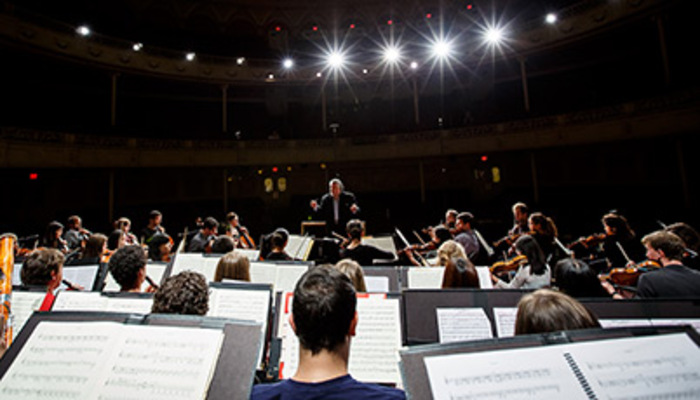
CMU PHILHARMONIC PERFORMS BANNED COMPOSERS AT CONCERT
Although anti-Semitism had been brewing in Europe for some time, on Nov. 9, 1938, it entered a new stage when, in a few hours time, Nazis set forth on a horrific path of terror against the Jews of Germany, destroying thousands of Jewish homes, businesses and synagogues.
Later known as Kristallnacht (“night of broken glass”), many scholars consider this event as marking the beginning of the Holocaust.
On Monday, the Carnegie Mellon University Philharmonic commemorated Kristallnacht with a performance. The orchestra played works by prominent European-Jewish composers whose music was banned during the Holocaust, the performance highlighted the Light/The Holocaust & Humanity Project, a month-long collaborative effort of 17 educational and artistic programs designed to encourage a communitywide dialogue about the Holocaust, sponsored by Pittsburgh Ballet Theatre and The Holocaust Center of Pittsburgh.
The Nazis used propaganda to expose and ban “degenerate” artists and composers prior to Kristallnacht. Monday night’s performance at Carnegie Music Hall in Oakland was intended to shed light on those composers and their music.
The program featured Martinu’s Lidice, Schulhoff’s Symphony No. 1, Barber’s Adagio for Strings, Schoenberg’s A Survivor of Warsaw and Mahler’s Todtenfeier.
Maestro Ronald Zollman led the Philharmonic, which is comprised of student musicians from across the United States and 19 foreign countries.
“This program fit so magnificently with the whole concept of Light/The Holocaust and Humanity Project,” said Edie Naveh, Holocaust Center director. “Most of the music deals with or included composers who were considered degenerate by the Nazi regime.”
Noel Zahler, head of Carnegie Mellon’s School of Music, believes that the concert emphasized the role of musical compositions as historical legacies.
“As a member of this great university and the community of Pittsburgh, I believe it is imperative that we commemorate events that should never be forgotten,” Zahler was reported as saying. “Bringing the music together for this concert is just one more way to reaffirm the important role music plays in the lives of individuals, regions and the global community. Many people who had been victims of genocide still performed and composed music, and those who witnessed the atrocities from afar also reacted musically. Bringing these works to life for a new generation is our obligation.”
More than 1,000 people were expected to attend the event. Through the support of Sandy and Edgar Snyder, 500 complimentary tickets were made available to the community, and arrangements were made to ensure that all Pittsburgh survivors, and their guests, could attend the performance, Naveh said.
The Snyders have sponsored communitywide Kristallnacht commemorations for the last seven years, Naveh added.
Ruth Drescher, whose family escaped from Germany nine months after Kristallnacht, when she was 5 years old, addressed the audience before the commencement of the concert.
Recollecting her own experiences in Nazi Germany, Drescher cautioned those in attendance to be mindful of other genocides occurring throughout the world.
“Let us never forget the millions who perished at the hands of those who were filled with evil,” Drescher said, “and let us remove the shutters on our eyes, which prevent our seeing where others are suffering throughout the world. At the very least we need to ask ourselves and our government, ‘How can we prevent further genocide and other crimes against humanity?’”
To view the original article, Click Here.